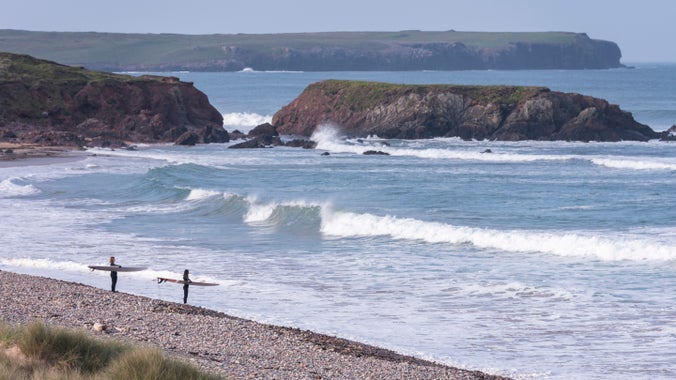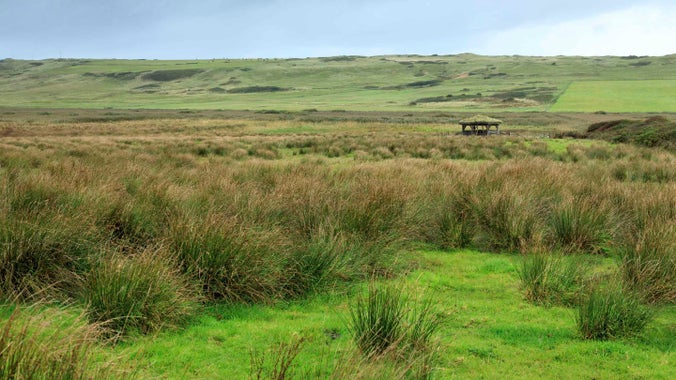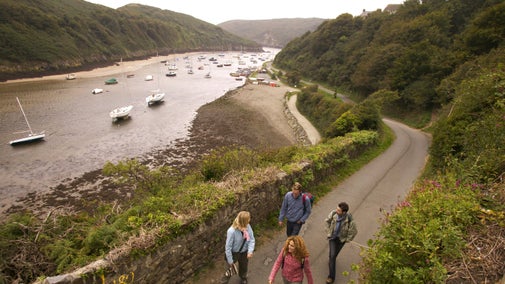
Discover more at Freshwater West and Gupton Farm
Find out how to get to Freshwater West and Gupton Farm, where to park, the things to see and do and more.

Freshwater West’s consistent swell and its strong waves make it one of Wales’s top spots for experienced surfers to visit. With strong rip currents in the area, it’s just the place for advanced water sports enthusiasts. Take a walk inland and seek out the new wooden bird hide to spot a variety of coastal birds.
Freshwater West is a stunning wide and sandy beach with extensive dunes, and is a popular destination for experienced surfers. There’s plenty of sand to build impressive sandcastles, try kite flying or walk along this wild stretch of coast. The beach has many rock pools for mini explorers to spot marine creatures.
The south-westerly facing beach is popular with surfers and is regarded as one of Wales's best surfing spots. Freshwater West is only recommended for the more experienced surfer due to the strong rip currents and force of the waves.
RNLI Lead Lifeguard Supervisor for South Wales, Chris Rigby, talks about the potential dangers of the water at Freshwater West: ‘Entering the water at Freshwater West can be very dangerous. It is home to large breaking waves, rip currents, submerged rocks and sandbanks.’
Please visit the RNLI website for further information.

Gupton Farm offers a campsite and self-catering surf lodge accommodation for those wanting to stay at Freshwater West a little longer. It’s a great opportunity to see this special place in a whole new light in a natural setting.
Gupton Farm is a great base for staying visitors who want to explore Freshwater West beach and the surrounding coastal countryside.
This traditional Pembrokeshire farm has been reinvented and is now your gateway to the surrounding area and beach. The farm is fully set up for camping and also provides self- catering accommodation for groups of up to ten people in the surf lodge.
The beach is a wild, sandy stretch adored by adventurous souls and nature lovers. Make the most of your visit on this beautiful part of the coast or head inland for wildlife watching opportunities.
For staying visitors, we’ve created an interpretation hub that shares an insight into Gupton Farm and Freshwater West’s history. There’s also an outdoor activity base which is now run by Outer Reef Surf School. A variety of watersports can be booked to enjoy along this natural coastline.
Book a watersports session here https://www.outerreefsurfschool.com/
Gupton Farm has a sustainable approach to farming with a conservation focus.
This approach has included restoring and extending the historic habitats and working with nature to adapt to coastal change.

Freshwater West is backed by a natural dune system and expansive wetland known as the Castlemartin Corse. This area has a variety of habitats that attracts many ground nesting birds.
To help you get closer to nature, we’ve opened up a network of new permissive paths that lead to a wooden bird hide. Don’t forget to bring your binoculars.
The bird hide was funded by our Neptune coastline campaign, a people-powered initiative established over 50 years ago to help preserve our special places by the sea. Your kind contributions have enabled us to create a brilliant base for wildlife watching. Thank you.

Find out how to get to Freshwater West and Gupton Farm, where to park, the things to see and do and more.
The Solva coastline contains hidden history just waiting to be discovered. Discover Iron Age forts, lime kilns and old mills during your visit.

Cleddau Woodlands are home to a whole host of flora and fauna, with varied landscapes of salt marsh and mudflats on the estuary, and oak woodlands to explore, there’s lots to see.
